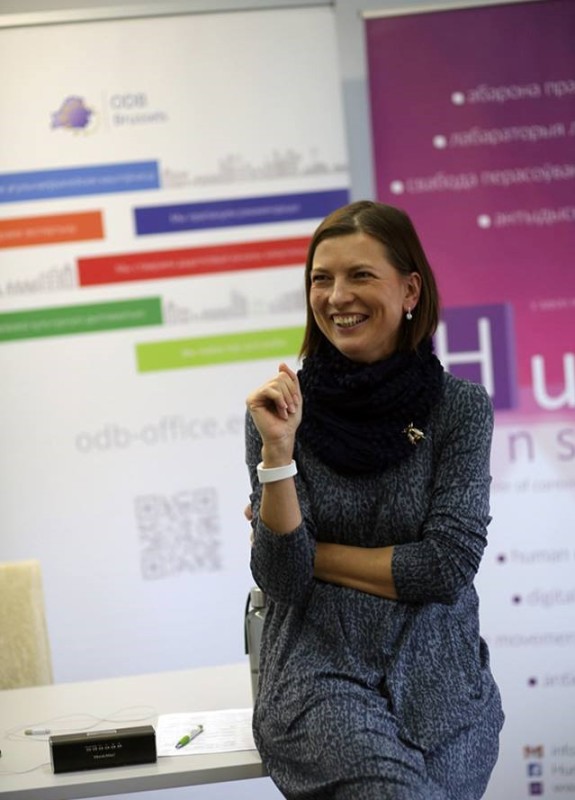
Voĺha Smalianka, lawyer and director, Legal Transformation Centre (Lawtrend), shares her impressions on the current situation faced by Belarusian.
“Belarus has had unfavourable conditions in terms of legislation and practices for CSOs for very many years now, – tells Voĺha. – Both saw deterioration in 1996, when representative offices of some international organisations began to close up.
Well, and 1999 saw the first public associations re-registration, which some of the CSOs failed to successfully complete. And they were wound up. A procedure of foreign aid registration was introduced for the first time in 2001, although earlier no ‘permit’ of any kind had been required, the organisations just used to receive international aid simply like any other assistance. Merely some ‘reporting filters’ had been applied, which is quite a regular thing.”
Foreign Aid
“At this moment, the system, which pertains to the CSO interests, rights or freedoms, is bad, – continues Voĺha. – Therefore, the new laws and norms adopted last year have not significantly changed the situation. They rather made things that were bad enough even worse. In practice, a significant deterioration has taken place, such as large-scale verifications and penal cases opened against some civil society activists and members, for example from the Belarusian Students’ Association (BSA) or the Office for the Rights of Persons with Disabilities.
The new presidential Decree No. 3 On Foreign Gratuitous Assistance was enacted in August 2020. It further reduced the list of objectives for which assistance may be received by the civil society organisations.
Yet, the fact is that the biggest problem is not the new Decree as such, but the very existence of the foreign aid registration procedure. On top of everything else, organisations have no idea whether aid would be registered and whether it would be tax-exempt.
The registration system is a selective one, with no clear justifications provided for a rejection. It means that one is likely to face a ‘luck of the draw’ type of situation. An organisation will have its assistance registered, while another will not. An assistance tranche will, while another one will not.”
The COVID-19 Pandemic and Quick Legislative Changes
“That being said, we are facing the COVID-19 pandemic situation: organisations had to restructure their programmes, transfer some of their operations online or completely seize some of their operations. In addition, CSOs have found themselves cut off from some of their resources.
And because of the quick legislative changes that adversely affect civil society operations, CSOs have to keep abreast on a permanent basis with the new registration regulations or the new reporting types, i.e. facing a new reality day in day out.
This is why if I had to answer the question: “Has the situation deteriorated within the last year?” – I would answer as a lawyer: “Yes, it has.” But the changes are not as tragic as the system itself.”

Annual Reporting by Public Associations
“In October 2020 the Ministry of Justice adopted its new Regulation No. 153-1 On Information and Activities by Public Associations and Foundations, – adds the lawyer. – In line with it, public associations and foundations must publish every year by the 1st of March information on their activities, on revenues received, on expenditures incurred and on any other property.
Is it good? From the viewpoint of the laws in effect, a transparent reporting form is generally good. Moreover, many organisations have published their reports before, especially if they engage in fundraising.
But if we look at the practices in the countries where this reporting form was in place before, we shall observe that the CSOs there enjoy a better legislative system than the businesses.
The difference exactly is that the non-profit organisations may not make money, but if they do and extract some profit, it shall be spent to pursue their statutory objectives. Accordingly, CSOs enjoy some preferences in the form of government support as bonuses, benefits or state social contracting. And then we understand why the government is in a position to request such reporting forms: because it under-receives on taxes.
The situation in Belarus looks different, as no benefits are enjoyed; rather, they are reduced with every passing year, but the reporting gets ever more complicated and exigent. Since August 2020 the number of reporting forms has increased for those organisations which registered their foreign aid.
Within the framework of the current political situation, all these reports can become a tool for exerting pressure against civil society organisations because the system is structured in such a way that the defence and law enforcement agencies have a long list of competences related to information disclosure and discovery.”
Are CSOs to Go?
“Inevitably, here comes the question: “Will it lead to CSOs disappearing from Belarus?” – says Voĺha. – But there are quite a few encouraging trends which are not top-down.
For example, being forced to operate under such unfavourable conditions, the organisations have learned how to survive against all odds. Besides, to a large extent the entire complex situation served as the basis for civil society to consolidate. A striking example can be provided by a huge number of civic and volunteer initiatives springing up in Belarus at the times of the COVID-19 pandemic. In addition, businesses are more eager now to contribute to social projects.
In general, people inherently tend to unite. And what is going on right now, grassroots initiatives, active volunteerism or residential project communities, is not going to reverse.”
This article was produced by OEEC team in the framework of the EU-funded ‘Eastern Partnership Civil Society Facility – Regional Actions’ Project.


